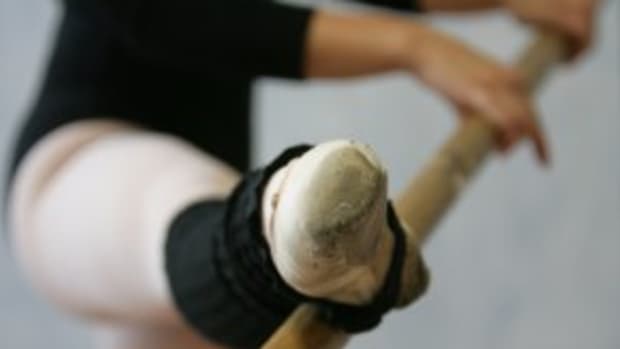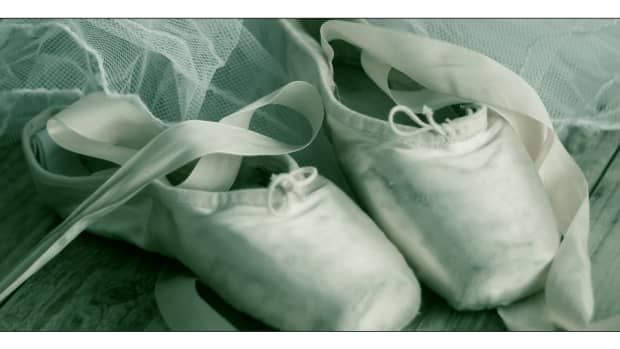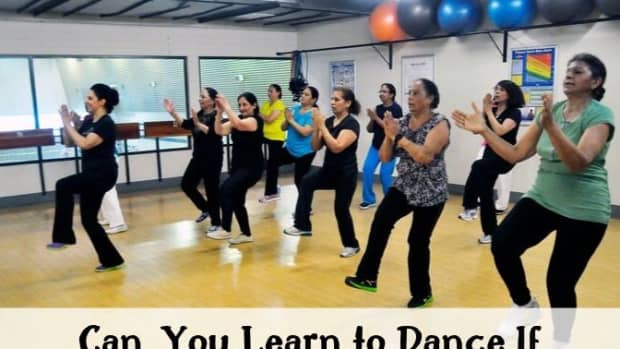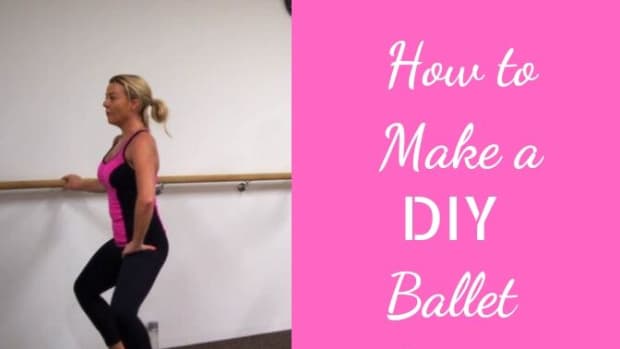Starting Ballet Late: 9 Things No One Tells You

Close up of me in the movement lab during my college years, wondering how I am going to make it, seemingly on my own.
Personal Collection
Can You Be Good at Ballet When You Start Late?
When starting ballet late, there are a number of things that race through your mind. "Am I too old to start?" is one of the most common questions, and usually your instructors will insist that you are "never too old."
In spite of this claim, however, you notice just how few classes are available to those who started ballet past a certain age. You notice how the only ones who seem to matter at the studio, performance-wise, are the "company girls" (and those who are on track to be). Everyone else is just there. You notice how the kids aged toddlers to 18 get to level up every year while there are no intermediate or advanced classes for teens and adults to level up to.
Though you are told you are "never too old" when starting ballet late, the very nature of how dance studios structure their classes and performances always seems to suggest otherwise.
Here are nine things I ran into on my ballet journey after starting late. These are things you will rarely be told explicitly yet are still hard truths that are impossible to ignore.
9 Hard Truths of Starting Ballet Late
- It really is an early starter's world.
- Finding and seizing opportunities will always be more difficult.
- Even if you manage to ace all the physical challenges, your lack of audition experience will come back to bite you.
- When people say, "You're never too old," they usually mean recreationally.
- Sometimes the most important strides are made by taking it slow.
- A few stand-out moves or qualities are not nearly the saving grace they may seem.
- "Tricks" are not everything. In fact, they're probably the least important thing.
- Basics reign supreme.
- Depending on your studio's offerings, you may need special accommodations.

I (back row, far left) was always the oldest one in my group by a pretty substantial margin, but was always happy to be going somewhere.
Personal Collection
1. It really is an early starter's world.
I will never forget the turmoil this one caused with my parents. They seemed to assume someone starting ballet late could just waltz in and progress just the same as their counterparts who began lessons when they were three. They would point to things such as the instructor they spoke with telling them it was never too late or a recreational ballet class on the schedule boasting an age range of "9–99." Whenever I would mention the ageism that ran rampant in the dance world, my father would respond, "Who says that?"
Let's just forget about having to speak to the director just to be able to take a ballet class that was actually "going somewhere" because there was nothing available for people starting ballet late besides recreational teen/adult classes.
Nobody says outright that you must start early. In fact, they will usually tell you the opposite. But generally the appreciation of ballet and enjoying dance as recreation is where the "never too old" ends. Ask if you're too old to reach a professional (or even merely a "high") level, and they will probably start singing a different (and brutally honest) tune.
2. Finding and seizing opportunities will always be more difficult.
One of my biggest points of envy starting ballet late was that my much younger classmates occasionally got to perform with the local professional company whenever they were casting children. I was always too old. Every now and then, one of them would also get to do a summer intensive, usually out of state. For that, I was always too inexperienced ... and then too old once I had the essential experience.
There simply weren't many opportunities outside of what I was doing at my own studio. Being a member of multiple studios at once was almost unheard of back then, and it wouldn't have been a feasible option for me on top of school and homework anyway.
If you're college age or older, even opportunities within your own studio might seem elusive at times if you're dancing in a program intended for middle and high school girls.
3. Even if you manage to ace all the physical challenges, your lack of audition experience will come back to bite you.
Being able to do something in class (or even on stage) and being able to do it in an audition are two very different things. Class is a familiar setting with familiar instructors who have gotten to know you well enough to differentiate when you're struggling because the difficulty is too high versus merely having an off-day. Stage performances, while more nerve-wracking, at least usually feature pieces that have been meticulously rehearsed and prepared ... in said familiar class with said familiar instructors.
Auditions are a totally different animal, at least in my experience, and a late starter's Achilles heel. You're in uncharted territory surrounded by unfamiliar people, all with technique at least as good if not better than yours. Things go at a much faster pace. The manner in which the material is presented may or may not click with you. To top it all off, how you do in this one single hour or two can determine the fate of your dance life for the rest of the year.
For me, all this was an especially heavy weight on my shoulders because in addition to starting ballet late, I was also a highly sensitive person (HSP) on top of it all. As such, I tended to flounder in audition-like settings. And when I say "flounder," I mean you'd think I'd never had dance before ... of any kind ... ever.
Eventually, I was able to shed this skin of vulnerability, but this was only after a string of auditions that were nothing short of utter shame and humiliation.

Front, far right. I was rejected from my college's audition-based company twice, but was thrilled to find one of the classes I signed up for was slated to perform an enactment of the "Tarantella" by a very talented ballet dancer/choreographer.
Meredith College Dance
4. When people say, "You're never too old," they usually mean recreationally.
This goes hand in hand with item #1. When starting ballet late, you may have been prompted to ask, "Aren't I a little old to be starting?" when signing up for classes. Usually this question will be met—often cheerfully—with, "Don't be silly! You're never too old!"
When you begin classes, however, it becomes clear that whomever you spoke to assumed you were asking about dance as recreation, with no serious aspirations.
I have touched on the fact that those starting ballet late don't have nearly the variety of classes or opportunities open to them. Another thing indicative of late starters not being highly valued is some of the dialogue you encounter from others starting late. Hannah Holmes, author of the Wonder of Ballet blog, touches on the subject extensively with her post, "Everyone Is Capable of Dancing Ballet Well."
Holmes states that sometimes these comments will be presented in jest. An instructor may say, "Well, it's not like we're preparing you for Swan Lake," while frequently reminding you that your dancing is for fun and fitness. In my own experience, adults as well as teens starting ballet late might marvel over how "good" the kids in the more advanced groups are while musing how they "could never do that," and "Oh, to be young again!"
I have also known some adult groups to collectively decide they do not want to be featured too heavily in performances because "the audience doesn't want to watch the old fogies." I always secretly felt like protesting such statements; I wasn't an "old fogie" and certainly didn't move like one!

The first dancing I ever did was of the cheerleading variety, as I showed here at a teen group talent show.
Personal Collection
5. Sometimes the most important strides are made by taking it slow.
One of the first things I remember being told when starting ballet late was that I like to jump into things, but ballet is a "different kind of energy," implying that progress is slow and steady. Unlike most beginners, I came into ballet with a solid athletic background, and don't think I took those words seriously enough. I don't blame anyone who tried to tell me this, though; one of the hardest things for an instructor to do is to convince his/her students that something will work or be to their benefit when they fail to see the logic behind it.
When starting ballet late, we feel a sense of urgency. We want to achieve as much as possible in as little time as possible, well aware of just how tiny that window is to reach the level necessary to be taken seriously in the business. As such, taking it slow can feel like pounding sand. It is important, however, to strike a balance between learning fast and steadily developing your technique.
6. A few stand-out moves or qualities are not nearly the saving grace they may seem.
This isn't an issue I have noticed among most starting ballet late, but it was a huge source of inner conflict for me, particularly in my early years of dancing.
As mentioned in item #5 (above), I came into ballet with an athletic background. It was an athletic background in artistic sports as well, like diving, cheerleading, and karate, rather than the more popular team and speed-based sports. This being the case, I already had all the basic skill sets emphasized in ballet (and dance in general) in pretty substantial amounts.
Because of my cheerleading practice, I had a jumping ability that made me stand out from day one. I could thrust myself higher off the ground than everyone else, including the company dancers, with very little effort. Because of my body type, any move predicated on brute athleticism or force also came easy. What never came easy was the effortless, airy grace and attractive body line.
Still, I was very frustrated that my physical skillsets seemed of minimal value to the system in place, and switching to gymnastics or back to cheerleading was less than appealing, as it would have meant an even later start in a sport every bit as unforgiving.
My physical prowess from my previous athletic background did help me adapt to ballet more quickly than your typical late starter, however. You just need to realize that even though ballet utilizes the same skillsets you were doing before, the technique these skillsets are applied to is very different. Patience really is a virtue.

8 years old at summer camp -- I'd been flipping off of diving boards my entire life. I, therefore, entered ballet with some concept of movement mastery.
Personal Collection
7. "Tricks" are not everything. In fact, they're probably the least important thing.
Jumping high, acrobatic potential, superior physical strength, explosiveness ... it all matters not. In hindsight, the only thing in my aforementioned embodiment of these qualities did was convince my father—who can't tell the (grossly obvious) difference between a tour jete executed by a gymnast versus one by a professional ballet dancer—that I was a far better dancer than I was.
Truth be told, whether starting ballet late or not, these "wow" factors will only fool the most untrained of eyes, which brings me to my next point.
8. Basics reign supreme.
For the longest time, I never took basics seriously. Though I always envied the girls (and guys) with beautiful basics, I was convinced that, starting ballet late, I would never be one of them. After all, everyone else had had since early childhood to fine tune their basics. I'd started at the age most of these girls were reaching (or would reach) their prime.
Because it was fairly obvious my basics weren't very polished, I was convinced I needed a standout move (or ten) to make up for it. I was all about my jumps first and foremost. I yearned for roles and dances with fancy jumps in them. I also tried to practice intricate turn sequences even though I had no clue what I was doing.
The way I saw it at the time, more difficult moves, like jumps, capitalized on my strengths of raw athleticism and physical strength while basics did nothing but highlight my weaknesses, like lack of a graceful body line and overall smoothness. Because my body type (short with stockier muscles, more like a gymnast), my basics looked especially awkward at times. It felt like I was doing steps dictated by more waiflike, longer-limbed people.
I always noticed that the best dancers all had the prettiest basics. I was also certain that could never be me. It wasn't until about my fifth year dancing—second full year of dancing primarily ballet—that I began to take the basics more seriously.
I had a Russian instructor who would at times give us the simplest looking combinations. At first I wondered if maybe she mistakenly thought we were beginners (I did the exercises without a word nonetheless). Later on, however, after thinking it was easy, things got trickier and I found it quite frustrating.
I came to realize the purpose of drilling the basics so hard was to build a foundation, which will make everything else easier and more consistent.

As the "Gift Fairy" in the Nutcracker. One of my biggest regrets is leaving that studio prematurely.
Personal Collection
9. Depending on your studio's offerings, you may need special accommodations.
It is no secret by now that your training opportunities are limited if starting ballet late. It will most likely be the instructor's first instinct to recommend teen/adult beginner or open classes. More often than not, there won't be much else offered past the intermediate level, if even that.
It might be wise to inform your instructor or studio director that you wish to be in a ballet class that is "going somewhere." If you want to go en pointe, let them know. They may let you in one of the company classes once you reach a certain level, though it will be with some much younger girls and you may not get to be in the performances.
Another thing many dancers starting ballet late are doing these days is mixing and matching classes from multiple studios. Some even incorporate private lessons when possible. A special focus on conditioning and core strength may also lead to faster and more efficient improvement.
Don't Be Discouraged, But Know What You're Up Against
I am not here to discourage anyone starting ballet late. Nonetheless, a late start in an unforgiving trade brings overwhelming road blocks. If you have any kind of serious aspirations, it is important to know what you are up against. I also believe it is important that anyone supporting you on your journey also understand the stakes.
Navigating the dance world after starting ballet late can be tricky, and your needs will not be the same as those who started at the traditional age. It can be done, however.
For the best possible outcome, you should never carry resentment towards these unwritten rules, but you should be aware they are there, and let that awareness be your guide.
More Resources for Late Starters to Ballet
- Advice for Late Starters to Ballet
Late starters to the art of ballet are always left out at most studios if they are hoping for anything more than weekly recreation. I was one of those dancers. This is what I would tell my former self, which is also my advice to other late starters.






